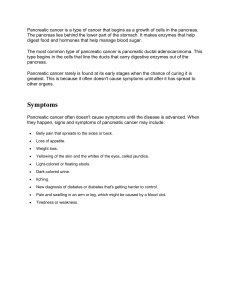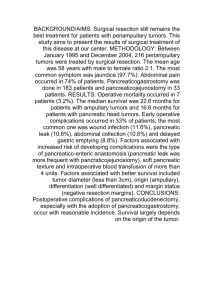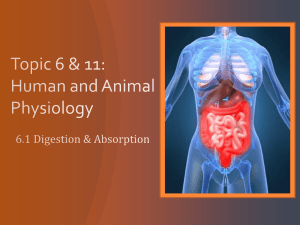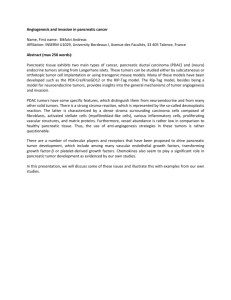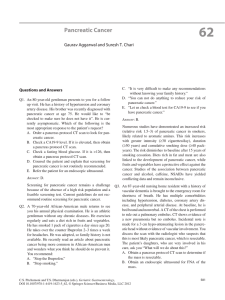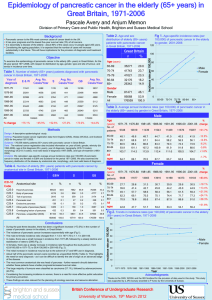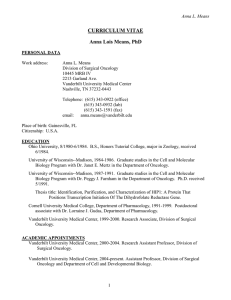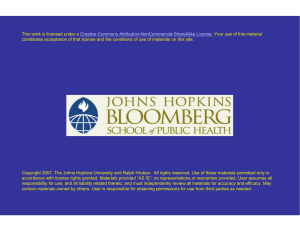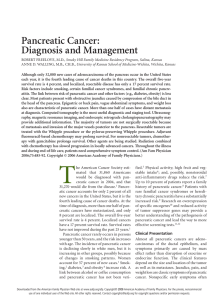Pancreatic Cancer - s3.amazonaws.com
advertisement
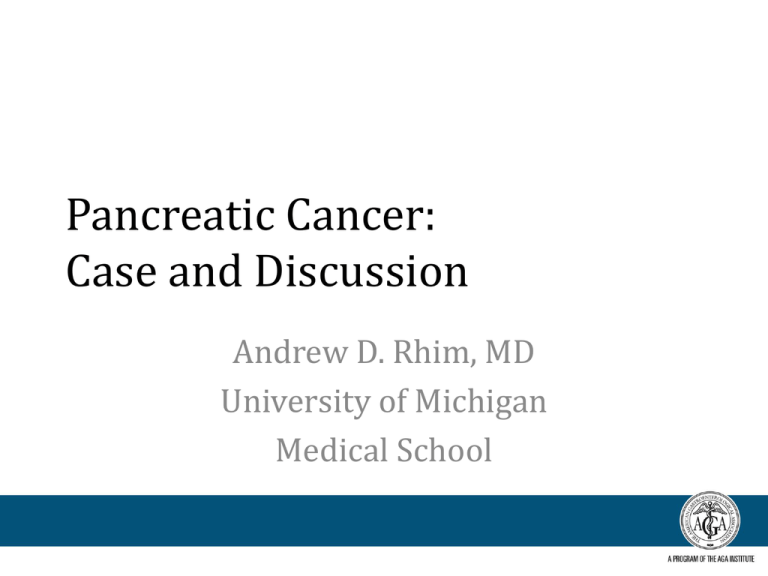
Pancreatic Cancer: Case and Discussion Andrew D. Rhim, MD University of Michigan Medical School Clinical Case • 72yo man presents to General GI clinic for abdominal discomfort after eating – Developed over the past 8-9 months – Vague, dull discomfort/pressure starting 10-20 minutes after eating and lasting for 30min to a few hours – Does not interfere with daily activities (2-3/10) – Located in the epigastrum, MAYBE radiating to his back – Not eating helps, though he has been careful to maintain caloric intake HPI • 72yo man presents to General GI clinic for abdominal discomfort after eating – No associated nausea, vomiting, diarrhea or constipation – Has noted 20lb weight loss in the past 2-3 months, though he denies anorexia – Denies new-onset depression, jaundice, malaise – Has noted increased urination and thirst (maybe) Review of Systems • • • • • • • • • • • • • • Constitutional: Positive for unexpected weight change. Negative for fever, chills, diaphoresis, activity change, appetite change and fatigue. HENT: Negative. Eyes: Negative. Respiratory: Positive for apnea and cough. Negative for choking, chest tightness, shortness of breath, wheezing and stridor. Cardiovascular: Negative. Gastrointestinal: Positive for abdominal pain. Negative for nausea, vomiting, diarrhea, constipation, blood in stool, abdominal distention, anal bleeding and rectal pain. Endocrine: Negative. Genitourinary: Negative. Musculoskeletal: Negative. Skin: Negative. Allergic/Immunologic: Negative. Neurological: Negative. Hematological: Negative. Psychiatric/Behavioral: Negative. (No depression) Past Medical History • History of colon cancer 10 years ago, in remission after colectomy. • GERD • HTN • COPD (previous smoker) • Cataracts • Diabetes mellitus II – Diagnosed 6 months ago – Recent requirement of insulin 2 weeks ago Social History • Previous smoker—quit 2011 • EtOH—4 cans a week, denies history of binging • No IVDA • Married with 3 grown children • Retired school teacher Family history • Colon cancer in father (60) • Unknown cancer in mother, sister, maternal aunt, maternal uncle. Physical Exam • • • • • • • • • • • • • • Constitutional: He is oriented to person, place, and time. He appears well-developed and wellnourished. No distress. HENT: Normal Head: Normocephalic and atraumatic. Nose: Nose normal. Mouth/Throat: No oropharyngeal exudate. Eyes: Conjunctivae are normal. Pupils are equal, round, and reactive to light. Right eye exhibits no discharge. Left eye exhibits no discharge. No scleral icterus. Neck: Neck supple. No tracheal deviation present. Cardiovascular: Intact distal pulses. Pulmonary/Chest: Effort normal and breath sounds normal. No stridor. No respiratory distress. He has no wheezes. Abdominal: Soft. Nl bowel sounds. He exhibits no distention. There is no guarding. Musculoskeletal: Normal range of motion. He exhibits no edema. Neurological: He is alert and oriented to person, place, and time. No cranial nerve deficit. Coordination normal. Skin: Skin is warm and dry. No rash noted. He is not diaphoretic. No erythema. No pallor or jaundice Psychiatric: He has a normal mood and affect. His behavior is normal. Judgment and thought content normal. Labs 144 98 10 4.3 30 0.98 31.5 241 ALT = 37 AST = 36 TBili = 1.6 Alk Phos = 99 Alb = 4.1 1.0 4.4 14.8 365 CT abdomen/pelvis • Pancreas: – Atrophy of body and tail of pancreas – Dilated main pancreatic duct with transition point, with no obvious mass lesion – Remainder of the pancreas appears normal • No lymph node enlargement or other masses. • Exam otherwise normal Next steps? A. B. C. D. E. Repeat cross sectional imaging (MRCP) Endoscopic ultrasound +/- FNA EGD + colonoscopy Treat patient for IBS Pancreatic enzyme supplementation Next steps? A. B. C. D. E. Repeat cross sectional imaging (MRCP) Endoscopic ultrasound +/- FNA EGD + colonoscopy Treat patient for IBS Pancreatic enzyme supplementation Why? High suspicion for neoplasm • HPI: – Vague, dull discomfort/pressure starting 1020 minutes after eating and lasting for 30min to a few hours – Located in the epigastrum, MAYBE radiating to his back – Has noted 20lb weight loss in the past 2-3 months, though he denies anorexia – Denies new-onset depression, jaundice, malaise – Has noted increased urination and thirst Why? High suspicion for neoplasm • PMH – Diabetes mellitus II • Diagnosed 6 months ago • Recent requirement of insulin 2 weeks ago • Labs: – Fasting glucose elevated – CT pancreas: • Abrupt cut-off of pancreatic duct • Atrophy of distal pancreas Mass in body of pancreas Diagnosis: Pancreatic ductal adenocarcinoma, Stage 1 Treatment: Surgical resection + Adjuvant chemo Pancreatic Cancer Epidemiology • Incidence: 11.7 per 100,000 – Rising incidence • 6.7% increase 19952005 • Lifetime risk: 1.41% – 1 in 71 Americans will be diagnosed w/ PC • Median age of diagnosis: 72 – Median age of death: 73 SEER, 2009 Pancreatic Cancer: An Imminent Threat Matrisian, Cancer Res 2014 Pancreatic Cancer: Poor survival due to metastatic disease • 5 year survival from diagnosis: <5% (all-comers) – 80% will present with invasive and metastatic disease at diagnosis • Even with chemotherapy, median survival is ~6mo – 20% will present with limited primary tumors with no metastatic disease • Most of these patients will undergo surgical resection Surgical Treatment • Only chance at cure • Only indicated for patients with: – Limited tumor burden – No evidence of mets – Satisfactory surgical risk • Whipple procedure v. distal • Relatively high morbidity – Post-op infection, leaks, bleeding – Brittle diabetes – Malnutrition and weight loss • Adjuvant chemtherapy recommended Poor survival even after surgery • Even without clinical evidence of metastasis, 5y survival after resection is poor (~20%) – Even with small tumors – Mostly due to metastatic disease Agarwal et al., Pancreas 2008 Early warning signs of PDAC • Abrupt onset of diabetes in non-obese individuals over the age of 60 – OR sudden insulin requirements or erratic blood sugar control • Depression • Evidence of pancreatic exocrine insufficiency – Foul smelling, floating stools – Malabsorption – Weight loss despite sufficient caloric intake • Non-specific symptoms: – Malaise, weight loss, anorexia, dull abdominal discomfort • Diagnostic test: pancreas protocol CT scan + IV contrast (though MR may be better) High risk groups • Chronic pancreatitis – Especially hereditary pancreatitis • Familial pancreatic cancer – ≥2 first degree relatives with PDAC • Other genetic syndromes – Familial Atypical Multiple Mole Melanoma Syndrome (FAMMM; 38fold increased risk) – Peutz-Jeghers Syndrome (36% lifetime risk) – BRCA 2 mutation – Cystic fibrosis? • Screening: alternating annual EUS + MRI/CT Conclusions • Pancreatic cancer is a horrible disease – Median survival of 6-8mo – Will soon be the second leading cause of cancer-related deaths in the US • While not perfect, there are “early” warning signs – Abrupt onset diabetes, weight loss, depression • Surgery is the only treatment that may lead to durable cure at this point in time (~20% live to 5y)
